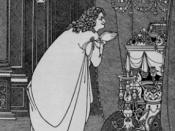Robert N. Watson suggests that Volpone exposes 'the fundamental human tendency [â¦] to live in grandiose egoistical fantasies rather than in the real world'. How far do you agree with the suggestion that this is the source of the play's comedy?
Ben Jonson frames Volpone by reminding the reader of its didactic value. In the Prologue, he wishes 'To mix profit, with our pleasure' (8), a line which puns comedy as a form of moral instruction with the play's monetary value, as the playwright's source of income. In the Epistle, he writes about 'the impossibility of any man's being the good poet, without first being a good man' (24-5), 'it being the office of a comic poet to imitate justice, and instruct to life, as well as purity of language, or stir up gentle affections'. To this end, this comedy is as much a morality play as it is a satire.
Set in Venice, which built its economy and identity entirely around exchange, Jonson provides a perfect setting for avarice, a desire broken loose from real objects and real needs. Indeed, avarice fuels the 'grandiose egoistical fantasies' which plague many of Volpone's characters, both in the main plot and subplot, those characters principally being the legacy hunters for whom 'Gold replaces God' (Watson, 1968, p.ix). Their ensuing misfortunes instruct Jonson's audience against such corruption, and so identify the 'fantasies' that led them to it as the main source of the play's comedy.
To state that these 'grandiose egoistical fantasies' scornfully reveal human vice, and thus to assert that their later humiliation imparts moral instruction on the audience, first requires an understanding of how their vices are exposed. Jonson's exposition comes not simply from the plot, but from the titular character. The mistake of pietistic students would be to...


